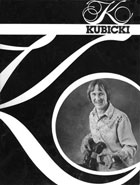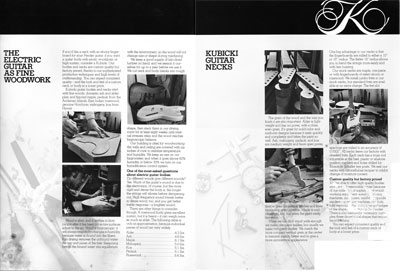|
Music IndustryTriad Speakers
|
Kubicki Guitars THE ELECTRIC GUITAR AS FINE WOODWORK |
 |
|||||||||||||||||||||||||
 |
||||||||||||||||||||||||||||
Kubicki guitar bodies and necks start with fine woods: domestic ash and alder, plain and figured maple, padauk from the Andaman Islands, East Indian rosewood, genuine Honduras mahogany, koa from Hawaii. Our building is ideal for woodworking: the walls and ceiling are covered with six inches of cork to stabilize temperature and humidity. We keep an eye on our hygrometer, and when it goes above 60% humidity or below 30% we tum on our humidification control system. One of the most-asked questions about electric guitar bodies: There are other things to consider, though. A rosewood body gives excellent sustain, but it is heavy--it can weigh twice as much as alder. The following table is only an approximation, because individual pieces of wood can vary widely.
The grain of the wood and the way you finish it are also important. Alder is lightweight and has no pores, with a close, even grain. It's great for solid-color and sunburst designs because it seals quickly and completely and takes the paint so well. Ash, mahogany, padauk, and koa are medium weight and have open pores; they're great for natural finishes and have interesting grain patterns. Maple is middleweight, too, but takes the paint easily like alder. When we can find wood wide enough we make one-piece bodies, but usually we make two-piece bodies. We match the more compact vertical grain at the center to transmit sustain better and to give a more symmetrical appearance. Kubicki Guitar Necks One big advantage to our necks is that the fingerboards are milled to either a 10" or 15" radius. The flatter 15" radius allows you to bend the strings more easily and with less buzzing. Custom quality but factory priced We're able to offer high quality bodies and necks at reasonable prices because of our collection of sophisticated woodworking equipment: automated milling machines, pin routers, oscillating spindle sanders--precision machines that faithfully reproduce the odd curves and edges of the shapes made famous by Fender. There is also handwork necessary: complex three-dimensional shapes that require hand finishing. You can expect consistent quality and the look and feel of a custom neck or body at a lower price. |